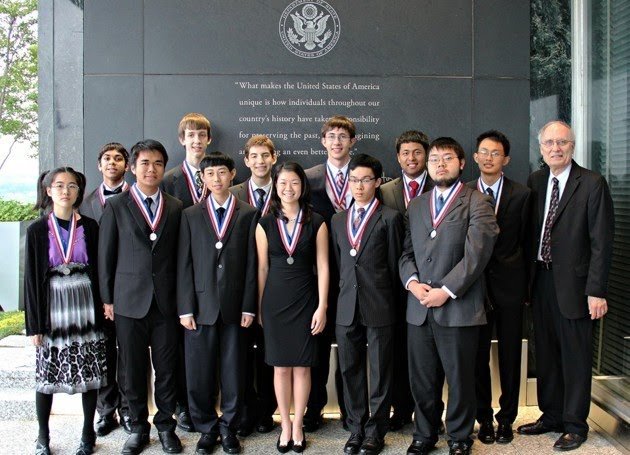Last month, the US Math Team took second place in the International Math Olympiad—for high school students—held in Cape Town, South Africa. Since 1989, China has won 20 out of 27 times (including this year), and in the entire history of the Olympiad, the US Math Team has won only 4 out of 55 times, so second place is a good showing. According to the American Mathematical Association website: “team leader Loh noted that the US squad matched China in the individual medal count and missed first place by only eight points.”
Reading about the US Math Team’s performance in the Olympiad this year takes me back to my senior year of high school in 1977 when, having taken 9th place in the US Math Olympiad, I was invited to travel to the International Math Olympiad in Belgrade as an alternate to the 8-member US Math Team. I chose not to go to Belgrade because the Olympiad conflicted with the National Speech Tournament, where my team couldn’t have tied on points for first place without me—while the US Math Team won without needing my help. This profoundly shaped my perception of myself as a “math person.
More than 36 years later, I have come to the view that almost everyone should think of herself or himself as a “math person.” In our column “There’s one key difference between kids who excel at math and those who don’t,” Noah Smith and I wrote this about the often-heard statement: “I’m just not a math person.”
We hear it all the time. But the truth is, you probably are a math person, and by thinking otherwise, you are possibly hamstringing your own career. Worse, you may be helping to perpetuate a pernicious myth—that of inborn genetic math ability
Not everyone agrees with us. Noah and I got some pushback for our rejection of the idea that inborn math ability is the dominant factor in determining math skill. So I did some more reading in the psychology literature on nature vs. nurture for IQ and for math in particular. The truth is even more interesting than the simple story that Noah and I told.
Math ability is not fixed at birth
Three facts run contrary to the idea that inborn mathematical ability is a dominantfactor in determining whether or not someone is good at math compared to others of the same age.
First, it is a reasonable reading of the very inconsistent evidence from twin studies to think that genes account for only about half of the variation in mathematical skill among kids. For example, this 2007 National Institutes of Health Public Access twin study, using relatively transparent methods, estimates that genes account for somewhere in the range from 32% to 45% of mathematical skill at age 10. That leaves 55% to 68% of mathematical skill to be accounted for by other things—including differences in individual effort. (Other estimates of the percentage of variation of mathematical skill in kids due to genes range all the way from 19% to 90%. )
Second, a remarkable fact about IQ tests, including the mathematical components of IQ tests, is that every generation looks a lot smarter than the previous generation. This steady increase in performance on IQ tests is known as “the Flynn effect” after the political philosopher James Flynn, who discovered this remarkable fact. The American Psychological Association’s official report “Intelligence: Knowns and Unknowns” says:
… performance has been going up ever since testing began. The “Flynn effect” is now very well documented, not only in the United States but in many other technologically advanced countries. The average gain is about 3 IQ points per decade.
At that rate, an IQ test from 100 years ago would put an average American today at an IQ of 130—in the top 5% of everyone back then. The American Psychological Association’s report goes on to say:
The consistent IQ gains documented by Flynn seem much too large to result from simple increases in test sophistication. Their cause is presently unknown, but three interpretations deserve our consideration. Perhaps the most plausible of these is based on the striking cultural differences between successive generations. Daily life and occupational experience both seem more “complex” (Kohn & Schooler, 1973) today than in the time of our parents and grandparents. The population is increasingly urbanized; television exposes us to more information and more perspectives on more topics than ever before; children stay in school longer; and almost everyone seems to be encountering new forms of experience. These changes in the complexity of life may have produced corresponding changes in complexity of mind.
In other words, although people a century ago were good at many things, many of them would have struggled with the kinds of abstract problems IQ tests focus on.
(As a simple example of how math standards have risen, my father tells me that when he was in high school, people thought calculus was too advanced for high school students. Nowadays, about one of every six high school students takes calculus in the US.)
Third (and I wish the research were clearer about this for math specifically), the fraction of differences in IQ that seem genetically linked increases dramatically with age. For children, about 45% of differences in IQ appear to be genetic, while for adults, about 75% of differences in IQ appear to be genetic. Think about that. How could it be that genes matter more and more as people get older—even though the older you get, the more environmental things have happened to you? What I think is the most plausible answer, is that the genes are influencing what people do and what they do in turn affects their IQ.
The “love it and learn it” hypothesis
No one yet knows exactly how genes, environment, and effort interact to determine mathematical skill. In light of the evidence above, let me propose what I call the “love it and learn it” hypothesis. This hypothesis has three elements:
1. For anyone, the more time spent thinking about and working on math, the higher the level of mathematical skill achieved.
2. Those who love math spend more time thinking about and working on math.
3. There is a genetic component to how much someone loves math.
Despite emphasizing time spent on math as the driver of math skill, this can explain why identical twins look more alike on math skills than fraternal twins. Since time spent dealing with math matters, it allows plenty of room for the average person to be better at math now than a hundred years ago. And the effect of loving math on math experience and therefore math skill is likely to only grow with time.
To get better at math, act like someone who loves math
If the “love it and learn it” hypothesis is true, it gives a simple recommendation for someone who wants to get better at math: spend more time thinking about and working on math. Best of all: spend time doing math in the kinds of ways people who love math spend time doing math. Think of math like reading. Not everyone loves reading. But all kids are encouraged to spend time reading, not just for school assignments, but on their own. Just so, not everyone loves math, but everyone should be encouraged to spend time doing math on their own, not just for school assignments. If a kid has a bad experience with trying to learn to read in school, or is bored with the particular books the teacher assigned, few parents would say “Well, maybe you just aren’t a reader.” Instead, they would try hard to find some other way to help their kid with reading and to find books that would be exciting for their particular kid. Similarly, if a kid has a bad experience trying to learn math in school, or is bored with some bits of math, the answer isn’t to say “Well maybe you just aren’t a math person.” Instead, it is to find some other way to help that kid with math and to find other bits of math that would be exciting for their particular kid to help build her or his interest and confidence.
The way a teacher presents a mathematical principle or method in class may not work for you—or, as Elizabeth Green suggested in the New York Times, the whole American pattern of K-12 math instruction may be fatally flawed. If you loved math, you would think about that principle or method from many different angles and look up and search out different mathematical resources, until you found the angle that made most sense to you. Even if you don’t love math, that would be a good way to approach things.
Many people think that because they can’t understand what their math teacher is telling them, it means they can’t understand math. What about the possibility that your teacher doesn’t understand math? Some people are inspired to a life-long love of math by a great math teacher; others are inspired to a life-long hatred of math by an awful math teacher. If you are unlucky enough to have an awful math teacher, don’t blame math for your teacher’s failings.
Cathy O’Neil—who blogs at mathbabe.org—describes well what I like to call “slow-cooked math”:
There’s always someone faster than you. And it feels bad, especially when you feel slow, and especially when that person cares about being fast, because all of a sudden, in your confusion about all sort of things, speed seems important. But it’s not a race. Mathematics is patient and doesn’t mind.
Being good at math is really about how much you want to spend your time doing math. And I guess it’s true that if you’re slower you have to want to spend more time doing math, but if you love doing math then that’s totally fine.
I was lucky to have a dad and older brother who showed me a bit of math early on, in a way that was unconnected to school. Then in school, I spent at least as much time on math when I wasn’t supposed to be doing math as when I was. It was a lot more fun doing math when I wasn’t supposed to be doing math than when I was.
For one thing, when I did it on my own, I could do it my own way. But also, there were no time limits. It didn’t matter if it took me a long time. And nothing seemed like a failure.
I spent a lot of time doing math. And very little of that math was done under the gun of a deadline. I spent some time on literal tangents in geometry and trigonometry. But I spent a lot more time on figurative tangents, running into mathematical dead ends. When Euclid told King Ptolemy “there is no Royal Road to geometry,” it had at least two meanings:
1. Everyone—even a king or queen—has to work hard if he or she wants to learn geometry or any other bit of higher math.
2. The path to learning geometry, or math in general, is not always a straight line. You may have to circle around a problem for a long time before you finally figure out the answer.
What can be done
I feel acutely my own lack of expertise in math education for students younger than the college students I teach. Fortunately, there are a wealth of practical suggestions for teaching and learning math by others who know more than I do, or have a different perspective from their own experience.
Noah and I received many comments in response to our post but the comments I learned the most from were from these people, who let me turn their comments into guest posts on my blog:
In Green’s article “Why Americans Stink at Math,” she talks about how differently math is taught in Japanese classrooms, and how we should hope that we might someday get that kind of math instruction in the US. The key difference is that in Japan, the students are led by very carefully designed lessons to figure out the key math principles themselves. That kind of teaching can’t easily be done without the right kind of teacher training—teacher training that is not easy to come by in the United States.
But some teachers at least encourage their students to follow a “slow-cooked math” approach where they can dig in and wrap their heads around what is going on in the math, without feeling judged for not understanding instantly. Elizabeth Cleland gives a good description here of how she does it.
Even when a student is lucky enough to have good teachers at school, a little extra math on the side can help a lot. Kids who arrive at school knowing even a tiny bit of math will have more confidence in their math ability and will probably start out liking math more. Even quite young kids will be interested in a Mobius strip made out of paper where a special twist makes what looks like two sides into just one side. And putting blocks of different lengths next to each other as in a Montessori addition strip board is exactly how I have always pictured addition in my head.
A Montessori addition strip board.
Extra math doesn’t all have to come from parents. In some towns, enough Little League soccer coaches are found for almost every kid to be on a soccer team. And even I was once drafted as a Cub Scout Den Leader. If people realized the need, many more adult leaders for math clubs for elementary and middle school kids could be found. In addition to showing kids some things themselves, math club leaders can do a lot of good just by checking out and sorting through the growing number of great math videos and articles online, as well as old-style paper-and-ink books.
I use Wikipedia regularly as a math reference. (There is no reason to think Wikipedia is any less reliable than the typical math textbook; textbooks are not 100% error-free either.) I have a post on logarithms and percent changes that is one of the most popular posts on my blog. (Maybe it is the evocation of piano keyboards and slide rules, or the before and after pictures of Ronald Reagan.) And Susan Athey, the first woman to win the John Bates Clark Medal for best American economist under forty, highly recommends Glenn Ellison’s Hard Math for Elementary School as a resource for math clubs. All of that just scratches the surface of the resources that are out there.
The obvious issue raised by the “love it and learn it” hypothesis is that some people may not start out loving math, and some may never love math. Acting as if you love math when you don’t may work, but it can be painful. So it is important to figure out what can be done to instill a love of math. Even if they only know a little math themselves, people who can get kids who don’t start out loving math to come to love it are a national treasure. As the brilliant business guru Clay Christensen (among others) has pointed out, in an age when lectures from the best lecturers in the world can be posted online, the kind of help students need on the spot is the help of a coach.
For too long, we have depended too heavily on overburdened math teachers who have remarkably little time in school to actually teach math, and whom the system has deprived of the kind of training they need to teach math as well as it can be taught. It is time for all of us to take the responsibility for learning math and doing what we can to help others learn math–just as we all take responsibility for learning to read and doing what we can to help others learn to read.
Most of us who participated as kids in a sport or other competitive pursuit remember a coach who got us to put in a lot more effort than we ever thought we would. Math holds out the hope of victory not just in a human competition, but in understanding both the visible universe and the invisible Platonic universe. There is no impossibility theorem saying there can’t be math coaches in every neighborhood who make the average kid want to gain that victory.
By QZ






